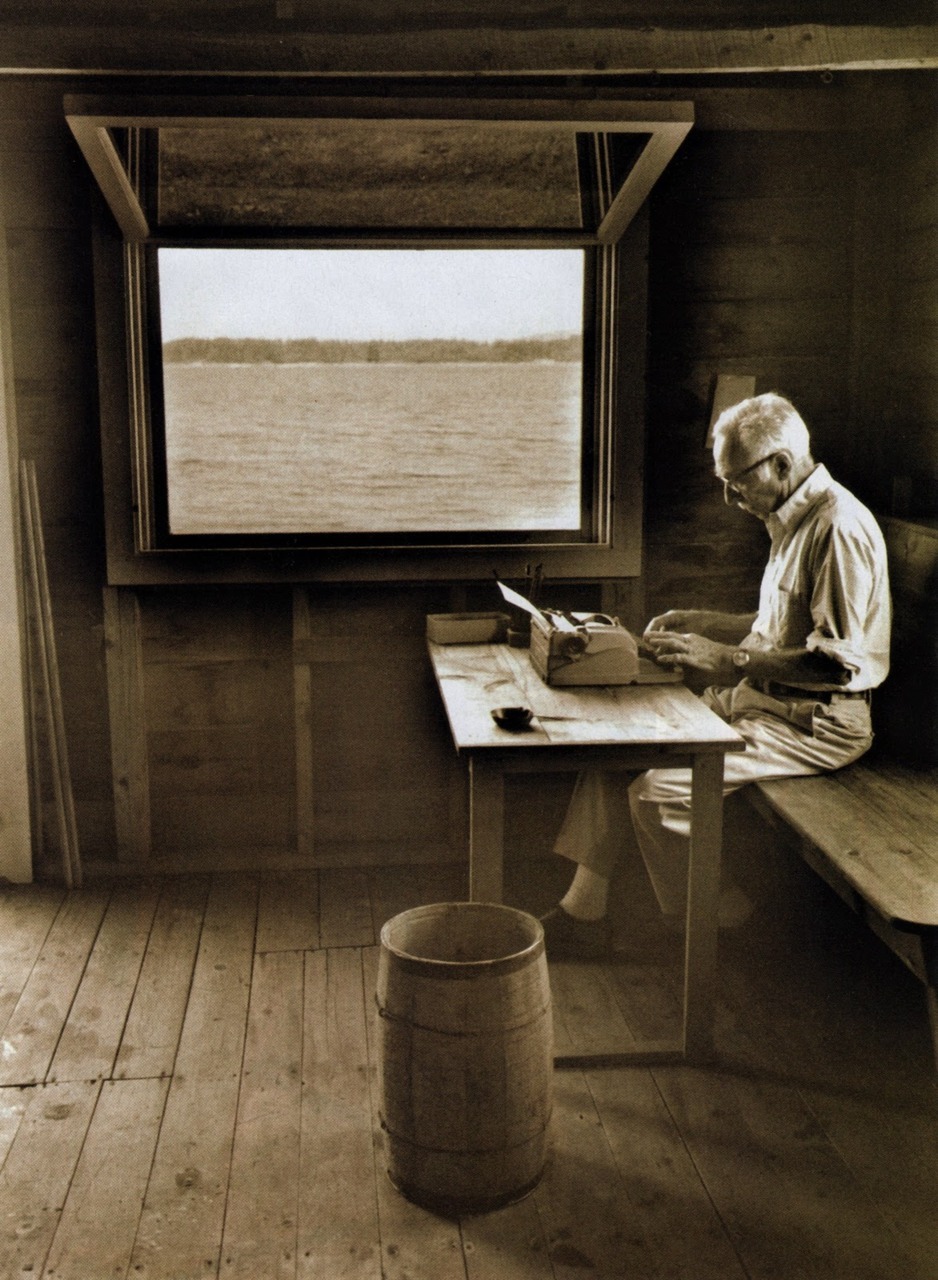"Todo en la vida
está en otra parte, y allí se llega en coche."

E.B. White in his boathouse in Allen Cove, Maine. "I arise in the morning torn between a desire to improve the world and a desire to enjoy the world," White once remarked. "This makes it hard to plan the day.” (Photo by Jill Krementz)
Hurricanes are the latest discovery of radio stations and they are being taken up in a big way. To me, Nature is continuously absorbing— that is, she is a twenty-four-hour proposition, fifty-two weeks of the year— but to radio people, Nature is an oddity tinged with malevolence and worthy of note only in her more violent moments. The radio either lets Nature alone or gives her the full treatment, as it did at the approach of the hurricane called Edna. The idea, of course, is that the radio shall perform a public service by warning people of a storm that might prove fatal; and this the radio certainly does. But another effect of the radio is to work people up to an incredible state of alarm many hours in advance of the blow, while they are still fanned by the mildest zephyrs. One of the victims of Hurricane Edna was a civil-defense worker whose heart failed him long before the wind threatened him in the least.
— E.B. White, from the essay The Eye of Edna, September 15, 1954 from the book
Essays of E.B. White, one of my favorite books I’ve read in many years. Photo by Jill Krementz of White in his writing space in Allen Cove, Maine.
E. B. White
(De Wikipedia, la enciclopedia libre)
Elwyn Brooks White (11 de julio de 1899 - 1 de octubre de 1985), escritor, ensayista y distinguido prosista estadounidense. Es muy conocido gracias a una guía de estilo para escritores, Los elementos del estilo (The Elements of Style en inglés), y por tres libros para niños que son considerados clásicos estadounidenses del género.
Breve biografía:
E. B. White nació en Mount Vernon, Nueva York y se graduó en Artes en la Universidad Cornell en 1921. Antes había sido repartidor de hielo y reportero del frente de batalla. Por varios años se desempeñó como escritor para el Seattle Times y el Seattle Post-Intelligencer y también trabajó como publicista. En 1924 regresó a la Ciudad de Nueva York.
En 1925 publicó su primer artículo en la para entonces recién fundada revista The New Yorker. En 1927 se unió a la planta de redactores. A lo largo de las siguientes seis décadas produjo una larga serie de ensayos, mientras que sus "Notas y Comentarios" (publicadas sin firma en la revista) fueron muy leídas a medida que la revista ganaba influencia. Gradualmente se convirtió en el más importante colaborador del The New Yorker cuando ésta era la más influyente revista literaria estadounidense. En este medio desarrolló las preocupaciones que acompañarían parte de su obra y su vida: el miedo a la guerra y a los fenómenos irracionales, el internacionalismo y el humor. Fue un escritor que abogaba por la paz.
En 1933 escribió un pequeño cuento de ciencia ficción, La supremacía del Uruguay, que a pesar de su calidad literaria inferior al resto de la obra de White, fue incluido en varias antologías. En esta narración, Uruguay conquista el mundo.
White también fue columnista para la revista Harper's entre 1938 y 1943.
A finales de los años 30, al convertirse en tío, empezó a escribir ficción para niños. Su primer libro para niños, Stuart Little (llevado no hace mucho al cine), fue publicado en 1945, y La Telaraña de Charlotte (en inglés Charlotte's Web) apareció en 1952. Ambos obras fueron aclamadas y en 1970 obtuvieron conjuntament la Medalla Laura Ingalls Wilder, un importante premio estadounidense en el campo de la literatura para niños. El mismo año, White publicó su tercera novela para niños, La Trompeta del Cisne (The Trumpet of the Swan). En 1973, ésta recibió el Premio Seqouyah de Oklahoma y el Premio William Allen White de Kansas.
En 1959 editó y actualizó el clásico The Elements of Style, un manual de estilo gramatical del inglés estadounidense escrito originalmente por William Strunk Jr. y publicado en 1918. Strunk había sido profesor de White en Cornell en los años posteriores a la Primera Guerra Mundial. Posteriores ediciones de The Elements of Style aparecieron en 1972, 1979 y 2000. Aún hoy es una herramienta para escritores y estudiantes estadounidenses.
En 1978 obtuvo un Premio Pulitzer especial por su obra. También recibió la Medalla Presidencial de la Libertad (Estados Unidos) en 1963 y la medalla de oro a los ensayos y críticas del Instituno Nacional (estadounidense) de Artes y Letras.
Fue admirado hasta la idolatría por personajes como Groucho Marx.
Murió el 1 de octubre de 1985 en su hogar en Maine.
El estilo de White es definido como el estereotipo del "Yanqui": torcido, reticente, reflexivo y culto. Se le consideró como un maestro de la lengua inglesa, reputado por su prosa clara, bien compuesta y cautivante.
(...) White had a hankering for the farm life. He bought an oceanside farm in Maine. Then he quit his job at the New Yorker and went to live at his farm. White’s experiences at the farm and in the rural community where he lived were the inspiration for his most famous book, Charlotte’s Web. Two other children’s books followed. It was the income from these books that enabled White to live his version of “the good life” in Maine. (...) (http://thedeliberateagrarian.blogspot.com.es/2009/03/little-bits-from-e-b-white.html)
 |
E.B. White's boathouse/ writing cabin
|
"(...) We are having splendid weather and I am building a stone wall. I understand that all literary people, at one time or another, build a stone wall. It's because it is easier than writing.(...)"
- Excerpt from a letter to Harold Ross. August 1936









No hay comentarios:
Publicar un comentario